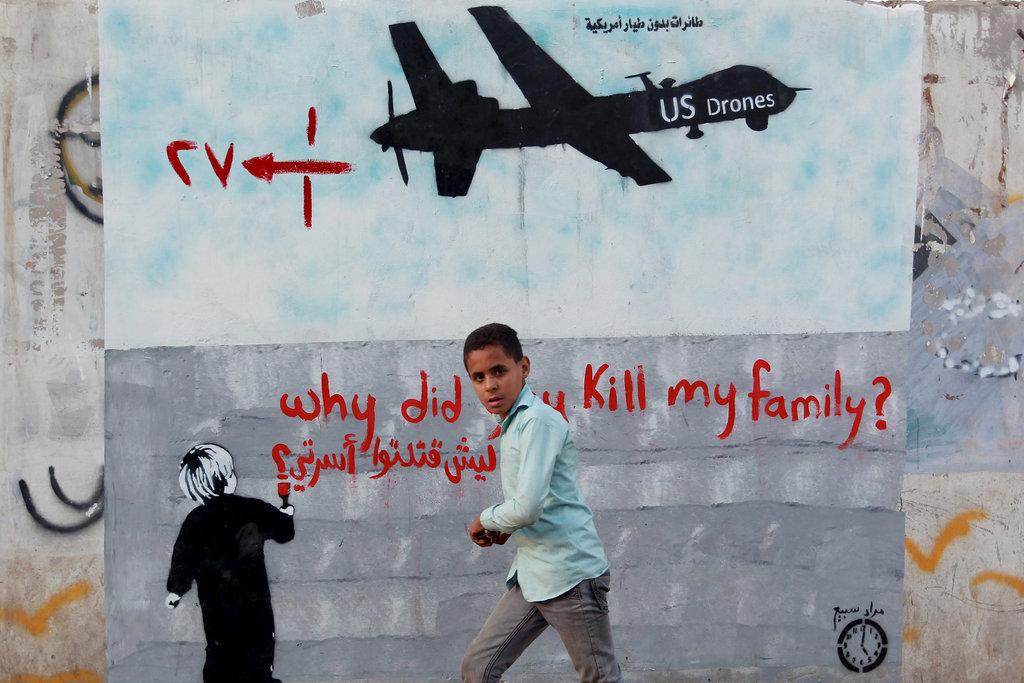Five years after Obama’s first drone strike, civilian victims remain without legal recourse
A Yemeni boy (C) walks past a mural depicting a US drone and reading ‘ Why did you kill my family’ on December 13, 2013 in the capital Sanaa. A drone strike on a wedding convoy in Yemen killed 17 people, mostly civilians, medical and security sources said, adding grist to mounting criticism of the US drone war.
Five years after the first drone strike conducted under President Obama killed at least nine Pakistani civilians, the secretive global campaign has now killed more than 2,400 people, at least 273 of them civilians including children, The Bureau of Investigative Journalism reported Thursday.
"Across Pakistan, Yemen and Somalia, the Obama administration has launched more than 390 drone strikes in the five years since the first attack…eight times as many as were launched in the entire Bush presidency," the London-based TBIJ said.
Critics of Obama's covert drone program, including former US officials, say the ratio of civilian casualties to actual militants is unacceptably high, and that the rage inspired by erroneous killings is actually radicalizing Pakistanis, Yemenis and others against the United States. Meanwhile, existing international legal structures have proven too weak to regulate American drone warfare.
"President Obama has waged his war on terror in the shadows, using drone strikes, special operations and sophisticated surveillance to fight a brutal covert war against Al Qaeda and other Islamist networks," reads a study conducted by Michael Boyle, who was part of Obama's counterterrorism advisory group ahead of the 2008 presidential election, for the Chatham House journal International Affairs. "The consequences can be seen in the targeting of mosques or funeral processions that kill non-combatants and tear at the social fabric of the regions where they occur. No one really knows the number of deaths caused by drones in these distant, sometimes ungoverned, lands.”
Islamic militants in Pakistan were the primary targets of US strikes under President George W. Bush and during Obama's early tenure. Beginning in 2011, covert operations stepped up in Yemen, where a US drone attack on a wedding party in December killed 12 people and renewed international criticism of American drone operations. Strikes in Pakistan have tapered off, with civilian casualties falling dramatically in 2013, and Secretary of State John Kerry promised last August to end American drone strikes there "very, very soon" amid pressure from Pakistani Prime Minister Nawaz Sharif and others.
As the Obama administration has shifted emphasis from Pakistan to Yemen as Al Qaeda has grown there, it has still largely avoided discussing drone strikes publicly. Most of the program, run by the Central Intelligence Agency, remains classified.
More from GlobalPost: The Drone Age, a Special Report
The US has also avoided legal responsibility for civilian casualties, along with its allies. This week a British court said that it would not "sit in judgement" about whether UK officials should be held responsible for their role in a 2011 drone strike that killed a tribal elder in North Waziristan, a Taliban stronghold in northern Pakistan that borders Afghanistan.
"However the claims are presented, they involve serious criticisms of the acts of a foreign state," three British court of appeal judges ruled. "It is only in certain established circumstances that our courts will exceptionally sit in judgment of such acts. There are no such exceptional circumstances here."
The legality of targeted drone strikes is an incredibly murky issue. Matters of state sovereignly, rules of war, international treaties and domestic law all come into play, and so far no governing body in the world has shown itself willing or able to judge the legality of America's drone war. Meanwhile drones have proliferated around the world, with the US setting what many have called a dangerous precedent in "flouting international law."
US groups including the ACLU and the Center for Constitutional Rights have filed several lawsuits against US officials involved in drone strikes, including a pending suit filed in July 2012 challenging the killing of three US citizens in Yemen in 2011: Anwar Al-Awlaki, Samir Khan and Abdulrahman Al-Awlaki. In May 2013, Attorney General Eric Holder acknowledged the killings in a letter to Congress.
Though some targets are clearly identified before attacks, former Obama advisor Boyle alleges that the CIA has employed a "guilt by association" approach in Pakistan, Yemen, Somalia and elsewhere that effectively treats all military-age males as enemies of the US. If innocent people are killed, advocates for civilian victims of drone strikes argue, there is little recourse. Kat Craig, legal director of human rights organization Reprieve, which represented the son of the Pakistani tribal leader killed in 2011, blasted US imperialism after the ruling went against her side.
"It is shameful that the risk of embarrassing the US has trumped British justice in this case," she said. "It now appears that the UK government can get away with murder, provided it is committed alongside an ally who may be sensitive to public criticism. It is a sad day when the rights of civilian victims of drone strikes take second place to the PR concerns of the US government."
